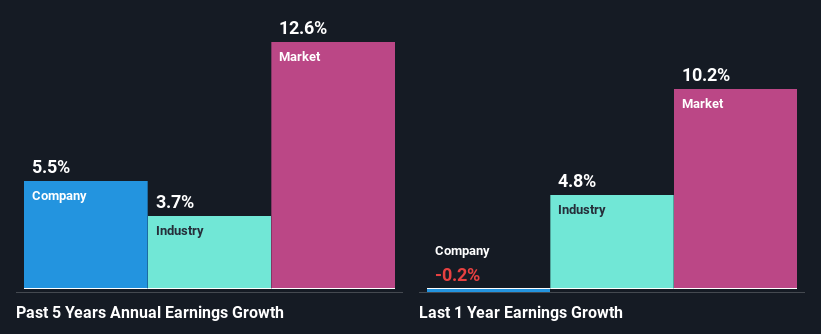Nomura Real Estate Master Fund, Inc.'s (TSE:3462) Has Had A Decent Run On The Stock market: Are Fundamentals In The Driver's Seat?

Most readers would already know that Nomura Real Estate Master Fund's (TSE:3462) stock increased by 4.5% over the past three months. We wonder if and what role the company's financials play in that price change as a company's long-term fundamentals usually dictate market outcomes. Specifically, we decided to study Nomura Real Estate Master Fund's ROE in this article.
Return on equity or ROE is a key measure used to assess how efficiently a company's management is utilizing the company's capital. Put another way, it reveals the company's success at turning shareholder investments into profits.
How To Calculate Return On Equity?
The formula for ROE is:
Return on Equity = Net Profit (from continuing operations) ÷ Shareholders' Equity
So, based on the above formula, the ROE for Nomura Real Estate Master Fund is:
5.1% = JP¥31b ÷ JP¥606b (Based on the trailing twelve months to August 2024).
The 'return' refers to a company's earnings over the last year. That means that for every ¥1 worth of shareholders' equity, the company generated ¥0.05 in profit.
See our latest analysis for Nomura Real Estate Master Fund
What Has ROE Got To Do With Earnings Growth?
Thus far, we have learned that ROE measures how efficiently a company is generating its profits. We now need to evaluate how much profit the company reinvests or "retains" for future growth which then gives us an idea about the growth potential of the company. Generally speaking, other things being equal, firms with a high return on equity and profit retention, have a higher growth rate than firms that don’t share these attributes.
Nomura Real Estate Master Fund's Earnings Growth And 5.1% ROE
When you first look at it, Nomura Real Estate Master Fund's ROE doesn't look that attractive. However, given that the company's ROE is similar to the average industry ROE of 5.8%, we may spare it some thought. Having said that, Nomura Real Estate Master Fund has shown a modest net income growth of 5.5% over the past five years. Considering the moderately low ROE, it is quite possible that there might be some other aspects that are positively influencing the company's earnings growth. Such as - high earnings retention or an efficient management in place.
We then compared Nomura Real Estate Master Fund's net income growth with the industry and we're pleased to see that the company's growth figure is higher when compared with the industry which has a growth rate of 3.7% in the same 5-year period.

The basis for attaching value to a company is, to a great extent, tied to its earnings growth. The investor should try to establish if the expected growth or decline in earnings, whichever the case may be, is priced in. Doing so will help them establish if the stock's future looks promising or ominous. One good indicator of expected earnings growth is the P/E ratio which determines the price the market is willing to pay for a stock based on its earnings prospects. So, you may want to check if Nomura Real Estate Master Fund is trading on a high P/E or a low P/E, relative to its industry.
Is Nomura Real Estate Master Fund Making Efficient Use Of Its Profits?
Nomura Real Estate Master Fund has a healthy combination of a moderate three-year median payout ratio of 48% (or a retention ratio of 52%) and a respectable amount of growth in earnings as we saw above, meaning that the company has been making efficient use of its profits.
Besides, Nomura Real Estate Master Fund has been paying dividends over a period of nine years. This shows that the company is committed to sharing profits with its shareholders.
Summary
In total, it does look like Nomura Real Estate Master Fund has some positive aspects to its business. Even in spite of the low rate of return, the company has posted impressive earnings growth as a result of reinvesting heavily into its business. With that said, on studying the latest analyst forecasts, we found that while the company has seen growth in its past earnings, analysts expect its future earnings to shrink. To know more about the company's future earnings growth forecasts take a look at this free report on analyst forecasts for the company to find out more.
If you're looking to trade Nomura Real Estate Master Fund, open an account with the lowest-cost platform trusted by professionals, Interactive Brokers.
With clients in over 200 countries and territories, and access to 160 markets, IBKR lets you trade stocks, options, futures, forex, bonds and funds from a single integrated account.
Enjoy no hidden fees, no account minimums, and FX conversion rates as low as 0.03%, far better than what most brokers offer.
Sponsored ContentValuation is complex, but we're here to simplify it.
Discover if Nomura Real Estate Master Fund might be undervalued or overvalued with our detailed analysis, featuring fair value estimates, potential risks, dividends, insider trades, and its financial condition.
Access Free AnalysisHave feedback on this article? Concerned about the content? Get in touch with us directly. Alternatively, email editorial-team (at) simplywallst.com.
This article by Simply Wall St is general in nature. We provide commentary based on historical data and analyst forecasts only using an unbiased methodology and our articles are not intended to be financial advice. It does not constitute a recommendation to buy or sell any stock, and does not take account of your objectives, or your financial situation. We aim to bring you long-term focused analysis driven by fundamental data. Note that our analysis may not factor in the latest price-sensitive company announcements or qualitative material. Simply Wall St has no position in any stocks mentioned.
About TSE:3462
Nomura Real Estate Master Fund
Nomura Real Estate Master Fund, Inc. (NMF) is a real estate investment corporation formed to own and invest primarily in office buildings, retail facilities, logistics and residential facilities.
Average dividend payer with questionable track record.
Market Insights
Community Narratives





